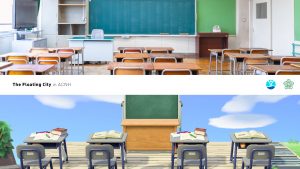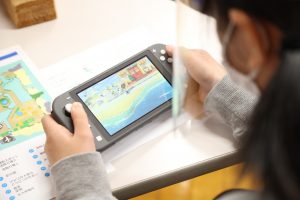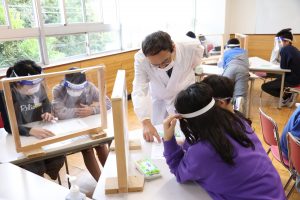Based on The 6th Sunamachi Elementary School, Tokyo Elementary School Uses Animal Crossing: New Horizons for Special SDG-focused Open Class
In-game island The Floating City helps boost awareness of environmental issues through gameplay and expert insights
The Floating City, a virtual island created within the popular Nintendo Switch game Animal Crossing: New Horizons (ACNH), is providing elementary schools with a platform for special lessons on the theme of SDGs. Led by the 6th Sunamachi Elementary School in Koto-ku, Tokyo, the initiative kicked off on December 10 with a special open class titled “Special Lessons in ACNH.” Participating children visited The Floating City for an opportunity to learn about environmental issues via the game.
Here is the link for “The Floating City”: https://the-floatingcity.com/en/
The Floating City is a virtual floating island launched within ACNH on December 8, 2020, with supervision from one co-founder of Blue Frontiers, a sustainable property developer currently working toward the creation of a real-world sustainable floating island in the Southern Hemisphere. The in-game island’s content is designed to boost interest in environmental issues among the younger generation, leveraging gameplay to encourage them to think about the future.
Special Lessons in ACNH at Koto-ku 6th Sunamachi Elementary School, Grade 5
The special open class saw participation from 30 children at Tokyo’s 6th Sunamachi Elementary School. The Floating City within ACNH is home to numerous animals, including some endangered species, and the virtual island also incorporates various activities for fun, guided learning.
Children actively asked questions in the session, which focused on current global environmental issues and was led by fisheries scientist Dr. Hiroaki Chiba, an associate professor at Kitasato University. After the lesson, Dr. Chiba commented, “Learning about the environment through games is a great educational tool which creates an opportunity to think about environmental issues and the future.”
The Floating City lets children experience environmental issues through ACNH
In the special lesson, children experienced The Floating City within ACNH through gameplay, deepening their understanding of environmental issues while visiting the island’s various virtual facilities. They learned about sustainable living on The Floating City, which echoes a real floating island, with a wind farm to create electricity through the power of nature and a restaurant serving dishes prepared only from ingredients grown on the island. The game also provides enjoyable opportunities to experience environmental issues, such as visiting a museum of endangered animals and talking with an African elephant. Children were excited by the fishing and bug-catching activities, and enthralled by the island’s many unique features.
Lesson topics: Global environmental issues and the future of fish
Dr. Hiroaki Chiba joined as a special guest instructor and delivered a lesson on what can be done to resolve current environmental issues and marine pollution. Beginning with an explanation of the serious environmental impacts of rising carbon dioxide levels, he described how Japan’s abundant ocean ecosystem has been disrupted by global warming and the acidification of seawater caused by this greenhouse gas, as well as by overfishing.
Dr. Chiba also raised the pressing issue of ocean plastic pollution, pointing out that the cumulative amount of plastic waste in the world is predicted to exceed 12 billion tons by 2050. These plastics are the source of countless “microplastic” particles that cannot be broken down by waves or ultraviolet rays, and even hold the potential to turn oceans into a plastic “soup” uninhabitable to fish. When asked by the children about fish populations around the world, Dr. Chiba explained that fish numbers are decreasing worldwide due to shrinking habitats for cold-water fish caused by global warming and rising sea temperatures.
Finally, students studied the adverse impacts of environmental damage on humans. They learned what they can do to be more eco-friendly and help prevent marine pollution, including practicing the three R’s (reduce, reuse, recycle) and purchasing ecolabelled products.
SOURCE The 6th Sunamachi Elementary School




